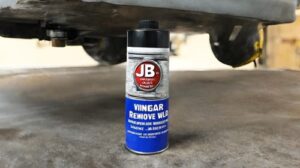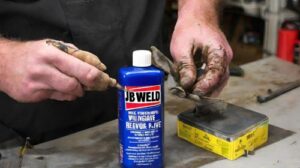Table of Contents
Have you ever found yourself in a sticky situation, quite literally, with JB Weld? Perhaps you’ve used it to mend a broken piece of metal or seal a leak, only to realize later that you must undo your handiwork. Fret not, as you’re not alone in pondering the age-old question: Will vinegar remove JB Weld?
In this article, we’ll delve deep into this problem to uncover whether vinegar holds the key to undoing the bond created by JB Weld. We’ll explore the science behind these materials, potential risks, and alternative solutions to help you navigate your DIY dilemmas. However, it’s important to note: No, vinegar is not an effective method for removing JB Weld.
So, grab a seat and a cup of coffee, and let’s embark on this journey to demystify the relationship between vinegar and JB Weld!
What is Vinegar?
Before we explore its potential in breaking down JB Weld, let’s get acquainted with vinegar. Vinegar is a common household item primarily composed of acetic acid and water. Its acidic nature makes it a powerful cleaning agent and a staple in kitchens worldwide. From pickling vegetables to disinfecting surfaces, vinegar boasts a myriad of practical uses.
Understanding JB Weld
JB Weld is not your average glue—it’s an epoxy adhesive renowned for its industrial-strength bonding capabilities. Composed of two parts, resin, and hardener, JB Weld forms a durable bond when mixed. Once cured, it can withstand extreme temperatures, water, chemicals, and pressure, making it ideal for various applications, from automotive repairs to plumbing fixes.
Vinegar and Its Properties
Now, let’s examine vinegar’s chemical properties. Acetic acid, the primary component of vinegar, acts as a solvent capable of breaking down certain substances through hydrolysis. This acidic property gives vinegar its distinctive sour taste and ability to dissolve various materials, albeit at different rates, depending on their composition.
Can Vinegar Remove JB Weld?
The burning question remains: Can vinegar effectively dissolve JB Weld? While vinegar is a potent solvent, JB Weld’s formidable bond presents a significant challenge. While it might weaken the bond over time, vinegar alone may not be potent enough to dissolve JB Weld completely, especially if the bond has fully cured.
How Does Vinegar Affect JB Weld?
Let’s explore the science to understand why vinegar may struggle to break down JB Weld. While vinegar’s acidity can initiate the breakdown of certain materials, JB Weld’s epoxy composition is specifically designed to resist chemical degradation. The cross-linking of molecules in JB Weld creates a dense network highly resistant to solvents like vinegar.
Steps to Remove JB Weld with Vinegar
If you’re determined to give vinegar a try, here’s a step-by-step guide:
- Prepare the Surface: Ensure the area is clean and dry before removing JB Weld.
- Apply Vinegar: Soak a cloth or cotton ball in vinegar and apply it directly to the JB Weld bond.
- Let it Sit: Allow the vinegar to penetrate the bond and work its magic for several hours or overnight.
- Scrub Gently: Use a soft brush or cloth to scrub the area gently and see if the bond begins to weaken.
- Repeat if Necessary: For stubborn bonds, repeat the process multiple times until the desired results are achieved.
Precautions and Safety Measures
While vinegar is generally safe to use, it’s essential to take precautions when attempting to remove JB Weld:
- Ventilation: Ensure adequate ventilation to prevent inhaling vinegar fumes.
- Protective Gear: Wear gloves and eye protection to avoid direct contact with vinegar.
- Test in an Inconspicuous Area: Before applying vinegar, test it on a small, hidden area to ensure it doesn’t damage the surface.
Alternative Methods for Removing JB Weld
If vinegar proves ineffective or you’re seeking alternative methods, consider the following options:
- Heat Application: Heating the JB Weld bond can soften it, making removing it easier.
- Chemical Solvents: Certain industrial solvents may be more effective in breaking down JB Weld.
- Mechanical Abrasion: Using sandpaper or a rotary tool to remove JB Weld mechanically.
Tips for Using Vinegar Effectively
For those determined to give vinegar a shot, here are some additional tips:
- Patience is Key: Vinegar may take time to show results, so exercise patience during removal.
- Use Concentrated Vinegar: Opt for a higher concentration of acetic acid for enhanced effectiveness.
- Combine Methods: Consider combining vinegar with other removal techniques for better results.
Conclusion
While vinegar’s acidic properties make it a promising candidate for dissolving certain materials, JB Weld’s robust epoxy composition presents a formidable challenge.
While vinegar may weaken JB Weld bonds over time, complete removal may require alternative methods or a combination of approaches. As always, exercise caution and prioritize safety when attempting DIY repairs.
FAQs about will vinegar remove jb weld
Can vinegar dissolve JB Weld instantly?
No, vinegar may take several hours or even overnight to weaken JB Weld bonds, and complete removal may require additional methods.
Can I use vinegar to remove JB Weld from plastic surfaces?
Vinegar may not be suitable for all materials, so checking compatibility and considering alternative removal methods for delicate surfaces like plastic is essential.
Can I use any type of vinegar to remove JB Weld?
Yes, you can use various types of vinegar, including white vinegar, apple cider vinegar, or even industrial-grade vinegar. However, keep in mind that the acidity levels may vary, affecting the effectiveness of the removal process.
What should I do if vinegar alone doesn’t remove JB Weld?
If vinegar proves ineffective, try alternative methods such as heat application, chemical solvents, or mechanical abrasion to remove JB Weld effectively.
Will vinegar damage the surface underneath JB Weld?
Vinegar is generally safe for most surfaces, but it’s always advisable to test it on a small, inconspicuous area first to ensure compatibility.


